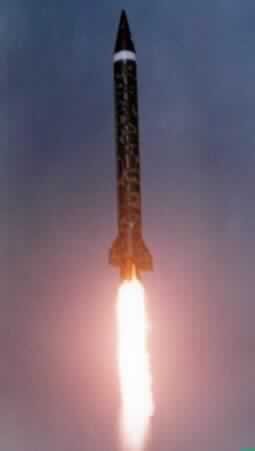HIGHLIGHTS: U.S. & Russia Ask Pakistan Stop the Tests Scheduled to End Tuesday. Putin Hopeful Musharraf & Vajpayee Could Meet at Regional Summit Next Month||Eleven Civilians Killed on Pakistani Side||Ten Mostly Armed Kashmiri Nationalists Killed in Indian Kashmir||STORY: Pressure mounted on Pakistan to call off a series of missile tests that have stoked tension with India and raised fears of war between the nuclear-armed South Asian rivals. India played down the tests as routine but boosted security to protect vital oil and gas installations. (Read photo caption)
The United States and Russia have asked Pakistan to stop the tests that began on Saturday with the launch of a medium-range missile capable of firing nuclear warheads at key Indian cities.
Pakistan said earlier a series of "routine" tests would continue until Tuesday but officials have given no indication when the next missile would be fired.
The two neighbors have massed a million men on their border since a deadly raid on India's parliament in December that New Delhi blamed on Pakistan-based Muslim militants.
Tension surged in the wake of a bloody May 14 raid on an Indian army camp in Kashmir by militants.
DIPLOMATIC FLURRY
President Bush, in Russia for a summit with President Vladimir Putin, expressed deep concern and called on Pakistan to stop militant raids into Indian-controlled territory.
Putin said the Pakistani missile test had added anxiety to an already tense climate
French President Jacques Chirac telephoned India's Prime Minister Atal Behari Vajpayee to discuss the tension.
Chirac said efforts must be redoubled to dry up the sources of terrorism and to seek a peaceful solution. He was due to telephone U.N. Secretary-General Kofi Annan and Musharraf later.
Observers say the timing of the test, Pakistan's first since 1999, is a defiant gesture that added to world alarm about what Secretary of State Colin Powell called a very dangerous situation on the subcontinent.
The United States warned its citizens against traveling to India and Pakistan and advised those there to consider leaving.
Australia issued a similar warning.
PUTIN HOPEFUL TWO LEADERS COULD MEET ON SIDELINES OF REGIONAL SUMMIT NEXT MONTH
Putin said he hoped Musharraf and Vajpayee could sort out their differences at a regional conference in Kazakhstan in June.
An Indian spokeswoman confirmed Vajpayee would attend the summit and might meet Putin. She could not comment on any plans to talk with Musharraf.
India and Pakistan have fought two of their three wars since independence in 1947 over Kashmir.
Pakistani and Indian forces on Saturday exchanged some of their heaviest fire in recent days.
Pakistani officials said at least 11 civilians were killed by Indian fire. Ten people mostly armed Kashmiri nationalists, were killed and 17 wounded in clashes in Indian Kashmir, Indian police said.
The two sides have regularly traded heavy fire across the Kashmir frontier for more than a week and dozens of civilians and soldiers on both sides have been killed and wounded. Thousands of civilians have fled front-line villages on both sides.
MUSHARRAF & VAJPAYEE, BOTH DEFIANT
Musharraf, declaring the test of the Ghauri surface-to-surface missile a success on Saturday, said Pakistan would fight if it had to.
Indian Prime Minister Atal Bihari Vajpayee, speaking in the northern town of Manali in the Himalayan foothills where he is on a break, said New Delhi's patience was running out and urged world leaders to step up pressure on Pakistan to stop the militants.
But he also dismissed the Pakistani missile test.
PHOTO CAPTION
In this handout picture from the Pakistan Defense Ministry, a new version of the Ghauri missile blasts off Saturday, May 25, 2002 from an undisclosed location in Pakistan. Pakistan tested the missile, which has a range of 1,500 kilometers (900 miles) and can carry nuclear warheads amid growing fears of a war with neighbor India, that could result in the use of nuclear weapons in South Asia, home to more than 1.2 billion people. (AP Photo/Defense Ministry)
- May 25 11:57 AM ET
- Author:
& News Agencies - Section:
WORLD HEADLINES


 Home
Home Discover Islam
Discover Islam Quran Recitations
Quran Recitations Lectures
Lectures
 Fatwa
Fatwa Articles
Articles Fiqh
Fiqh E-Books
E-Books Boys & Girls
Boys & Girls  Women
Women










